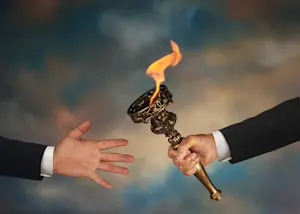What Makes This Word Tick
"Misanthrope" is a word with a bit of bite, referring to someone who harbors a deep-seated dislike or distrust of humankind. It's a noun, and it's not the sort of term you want to see in your biography unless you're auditioning for the role of a brooding existential philosopher. This word paints a picture of someone who would quietly roll their eyes at humanity's foibles rather than reach for a tambourine at a drum circle.
If Misanthrope Were a Person…
Imagine a solitary figure, perhaps with a penchant for black turtlenecks, sipping espresso in a corner cafe. They would certainly have a wry smile, always ready with a quip about the eternal predictability of human nature. Their best friends would likely be literary characters rather than colleagues, and they're always prepared with a sardonic observation just when you thought it was safe to love humanity again.
How This Word Has Changed Over Time
"Misanthrope" hasn't changed much—this grumpy old timer has been around since the late 16th century, though its tone has softened from outright horror to more of an eye-rolling skepticism. Over the centuries, it's appeared to critique not just individuals, but institutions and ideas that embody the imperfections of humans.
Old Sayings and Proverbs That Use Misanthrope
While traditional proverbs don't toss "misanthrope" around lightly, they do share its sentiment: "He who despairs over the condition of the world shows misanthropy" is as close as they come. It reflects the idea that life isn't perfect, but someone with a heart for humanity isn't quick to give up on it.
Surprising Facts About Misanthrope
Did you know that "misanthrope" was popularized by the skeptic philosopher Michel de Montaigne? It also takes center stage in Molière's 1666 play, "Le Misanthrope," which pokes fun at self-righteous indignation. The word has a sister term, "misanthropy," which is not much jollier.
Out and About With This Word
If you were to take "misanthrope" out for a night on the town, you'd likely end up at a quiet bookstore, followed by a French film that involves a lengthy discussion on the futility of existence. Watch enough films about anti-heroes, and you'll spot its essence: think of those slightly dark, introspective characters that ponder on why everyone just can’t be better.
Pop Culture Moments Where Misanthrope Was Used
"Misanthrope" marauds through pop culture with zest, notably keeping company with characters like Dr. House from the TV series "House" or Marv from the stunningly dark comic "Sin City." Such characters staple their identity to skepticism and cynicism, leaving a trail of memorable one-liners.
The Word in Literature
In literature, "misanthrope" strolls alongside characters who are complex and deeply introspective. From Dickensian figures to Dostoevsky's brooding muses, the word echoes through narratives steeped in moral dichotomy and societal critique. It fits comfortably in the pages of social narratives that question the essence of human nature.
Moments in History with Misanthrope
Imagine the folks gossiping in a 17th-century Parisian salon where Molière's "Le Misanthrope" was first performed. This play was a satirical take on the societal norms of his time, and anyone complaining about the status quo might have been branded, ahem, a misanthrope, painting them as folks with a critical eye for society’s follies.
This Word Around the World
Globally, the misanthrope's spirit manifests variably. In Japan, the term "hikikomori" describes a person who withdraws from society, capturing a similar sentiment. In Russian literature, the existential musings of characters akin to "misanthropes" are plentiful. Each culture finds its own way to express the mistrust or critique of humanity.
Where Does It Come From?
Our dear "misanthrope" stems from Greek roots: "misos," meaning hatred, and "anthropos," meaning human. This combination marched its way through the English language via French, emerging as a full-fledged term ready to critique the human race with the disdain it feels it deserves.
How People Misuse This Word
It's not uncommon to hear "misanthrope" used to label someone simply having a bad day—when in reality, true misanthropy runs deeper. It's a philosophical stance, not a mood swing or an offhanded social complaint after a tough board meeting.
Words It’s Often Confused With
Pessimist: Both are critical, but a misanthrope takes it further with a general dislike for humanity, rather than just expecting the worst outcomes.
Hermit: A hermit is merely reclusive without the implied disdain for fellow humans.
Cynic: Cynics are skeptical of motives but don’t necessarily harbor an overarching dislike for people as a group.
Additional Synonyms and Antonyms
Synonyms include "cynic," "recluse," and "hermit." Meanwhile, antonyms might feature words like "philanthropist," "optimist," and "humanitarian."
Want to Try It Out in a Sentence?
"While Jane liked to think of herself as a realist, her friends often teased her about tipping over into misanthrope territory every time she warned them about trusting digital marketing algorithms."
















